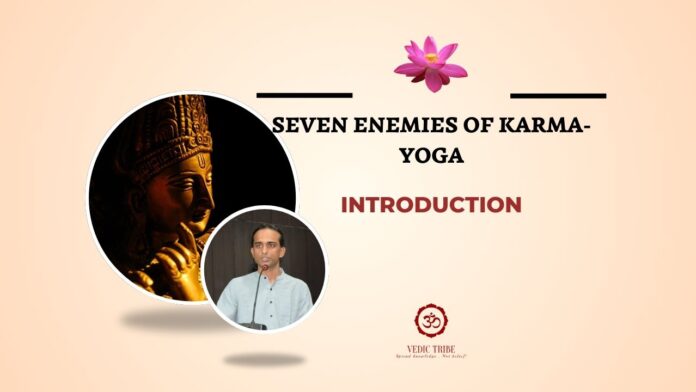Seven Enemies of Karma Yoga: Obstacles to Equanimity
In the Bhagavad Gita, Lord Krishna extols the path of “karma yoga”, the yoga of action. This philosophy emphasizes performing one’s duties without attachment to the results. To achieve this, one must cultivate equanimity, a state of mental balance where success and failure are viewed with equal detachment.
In Bhagavad Gita, Lord Krishna says that equanimity of mind is “yoga” (2:48). When this equanimity is maintained while performing actions, then it is called “karma-yoga”.
Equanimity:
Equanimity of mind refers to a state of mental balance and stability where one can remain calm and composed, regardless of the circumstances. It involves treating all dichotomies, or opposing pairs, with equal importance and detachment. These dichotomies can include:
Success and failure: Viewing both with the same level of acceptance and learning from each.
Pleasure and pain: Experiencing both without excessive attachment or aversion.
Gain and loss: Remaining unaffected by both, understanding that everything is impermanent.
Praise and criticism: Accepting both without letting them unduly influence one’s self-worth.
Hope and despair: Maintaining a balanced perspective, avoiding extremes of optimism or pessimism.
In essence, a karma yogi acts with a sense of responsibility and dedication, but without being driven by personal desires or fears. They understand that the true reward lies in the action itself, not in its outcome. And most importantly, the true reward is emancipation from the material world and unity with the cosmic consciousness.
Is this easy?
No! There are inherent difficulties in maintaining equanimity.
While it’s easy to understand the concept of remaining unattached to outcomes, putting it into practice is challenging due to various internal and external factors. Overcoming these deterrents requires consistent effort and practice.
The Vedic Tribe is happy to discuss these seven enemies of Karmayogi; ie., factors affecting equanimity of mind and their remedy:
1. Lethargy
2. Mental Exhaustion
3. Cultural cringe
4. Jealousy
5. Weak benevolence
6. Compensation effect
7. Self-aggrandizement
In the next article, we will discuss the enemy “lethargy”.
Our intention is to equip you to walk the path of Karmayoga without any deterrents.
All the best.
Madhwesh K
Vedic Tribe

